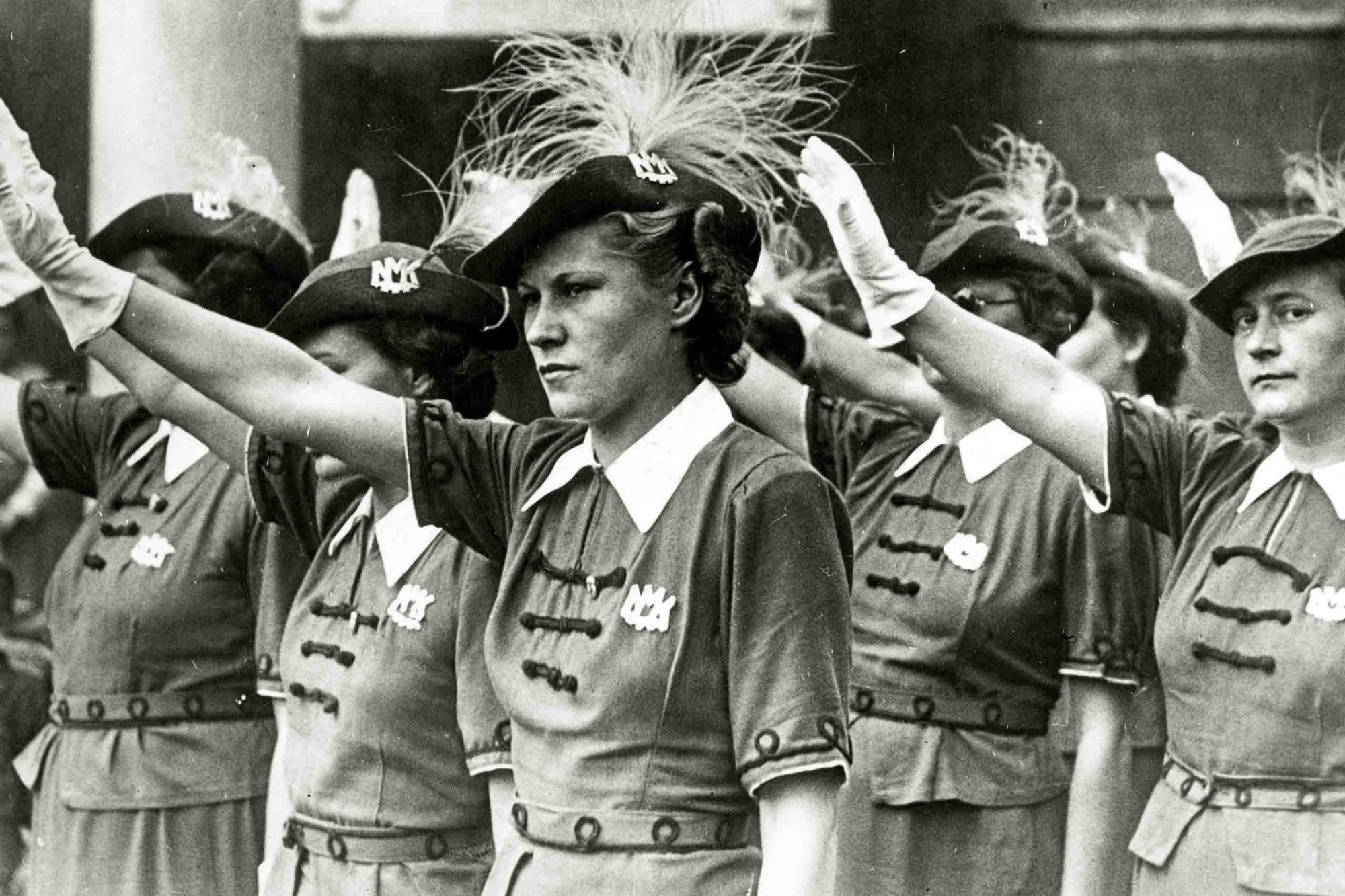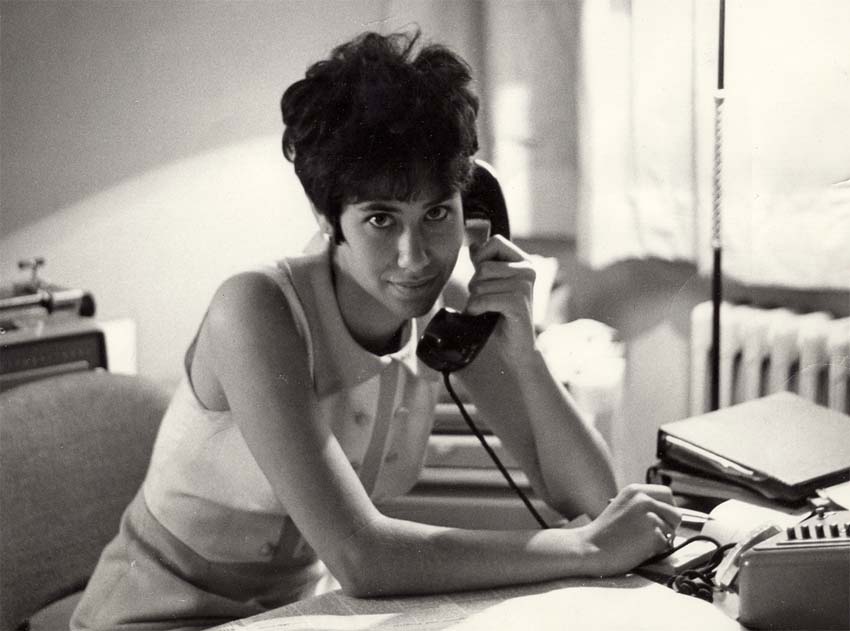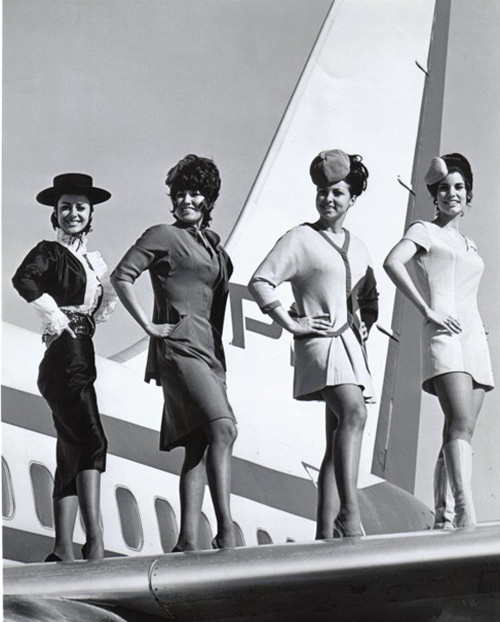Wendy Lower is most recently the author of Hitler’s Furies, a nonfiction finalist for this year’s National Book Awards, which will be awarded on Wednesday night.
Author: Wendy Lower
Listen: Play in new window | Download
Subjects Discussed: Marriage and genocide, the hausfrau who shot at Jews from the balcony, Liesel Willhaus, Hitler’s “baby machine” speech in 1934, Nazi ideology and gender roles, Volksgemeinschaft, Erna Petri, societal cues and massacring children, the fluidity of women’s personality in 1930s Germany, women in higher education restricted from participation, women who advanced up the social ladder, the League of German Girls, upward mobility among German women existing before the Nazi regime, Michael Wildt, looking at history through mundane everyday activities, Leni Riefenstahl’s rally footage, organized marches as rituals, looking at the motives for people who participated in these marches, concentrating on the half million women in the Eastern territories where communities of violence flourished, the Red Swastika Sisters, women serving as nurses, Annette Schücking, women listening to men boasting of massacres and being forced to comfort them, Nazis socializing by looking down at the inferior to affirm their superiority, Claudia Koonz’s Mothers in the Fatherland, women’s complicity in Nazi crimes, secretaries and bosses organizing massacres together, complicity in the workplace, shooting people from balconies, differing ideas about Vera Wohlauf, Christopher Browning’s claim of men feeling uncomfortable by Wohlauf’s presence because it made them feel shameful, Goldhagen’s ideas of men proud of their acts, genocide as men’s work, Browning’s Ordinary Men, German women using their pregnant condition to reduce their perceived culpability, the question of whether being close to the Miedzyrzec Aktion makes you an accomplice to atrocities, terrorizing by attendance, defining women’s culpability in relation to men, Gertrude Segel and Felix Landau, why it’s taken so long to consider women as part of the Nazi regime, how focusing on killing centers shifts the dialogue away from exploring violence within the general population during the Holocaust, how the German and Austrian courts excluded witness testimony after the war, how many women committing atrocities were allowed to return to regular life, cruelty focused on eroticized forms by the courts, the 500 women vs. the 20,00 men who stood trial after the war, low conviction rates, the Lemberg Trial, appearance stereotypes, the curious case of Johanna Altvater Zelle (aka Fräulein Hanna), how masculine appearances of women “explained” barbaric behavior, the natural Germanic ideal and its role in Nazi crimes (and subsequent exoneration), Nazi cowgirl types, Karl May, Nazi ideas of the wild west, German women telling journalists, scholars, and historians exactly what they wanted to hear (and how scholars have sorted out the truth from the hyperbole), the choices that women had under the Nazi regime, euthanasia programs, duty prevailing over morality, executed women, Nazi Empire Building and the Holocaust in Ukraine, resistance figure Maria Kondratenko, women who took advantage of the Nazi idea that women were intellectually inferior, why gender matters in looking at the Holocaust, the Black Misha, how secretaries were responsible for the administrative part of the Holocaust, workplace relationships and Nazi socialization, Nazi consumer culture, German women who were raped, and questioning the narrative of innocence.
EXCERPT FROM SHOW:
Correspondent: Let’s discuss the idea of genocide as men’s work under the Nazi regime. There was this duty to serve the Reich and anyone who was considered work-shy was sent to a concentration camp, of course, to be reeducated. Men were expected to go out and perform an Aktion, which meant of course massacring Jews. You have this idea of marriage, where a woman had to be fulfilled with domestic work while she was simultaneously subordinate to her husband. But then you have people like Liesel Willhaus. She would often shoot at Jewish slaves working on her villa from her second story balcony for the sport of it. So I’m wondering. To what degree were figures like Willhaus responding to Nazi societal cues and to what degree were they reacting to these gender roles that were associated with work?
Lower: You know, in a speech that Hitler gave in 1934 at one of the rallies, he was very explicit. He said that women are supposed to serve their Reich to propagate the race. As baby machines, as it were. He didn’t use that term. But that’s kind of how we’ve come to understand it. But he also mentioned using the term “fellow combatants,” which I refer to in my book. And I do that deliberately to show that there were two strands of thinking in Nazi ideology vis-à–vis women and gender roles. One was obviously predominantly racial: the drive to expand the German race. But that drive to expand the German race was about survival. And survival was about militarized operations and it was expansion of the living space and building of the empire. So you have women in the role of the expansion of the German population to fulfill these megalomaniac global ambitions of Hitler’s and also serving as fellow combatants. There you see this paradox, where you see the kind of femininity of the hausfrau, of the mother, of the wife. But they also are mobilized in these campaigns. And the uniform culture, for instance, that is very a clear theme in my book, when these young women like Liesel Willhaus aspire to seek careers through the party and better themselves. They’re swept up in this fervor when they’re mobilized to go to the Eastern territories. She was sent to the Ukraine in this case. So there’s social mobility that is possible in the Volksgemeinschaft. But it has both this traditional feminine role as well as this very militaristic revolutionary experiment.
Correspondent: I guess what I’m trying to unravel here — I mean, I looked also to Erna Petri. She comes to the East in June 1942, observing her husband Horst beating and sexually assaulting servants shortly after arriving in Thuringia. By the summer of 1943, she’s already not only an accomplished hausfrau hostess, but she invites six starving Jewish children in and she shoots them in the back of the head. She had heard other Nazis saying that this was the best way to dispose of them. And the thing that fascinates me, and I’m hoping to hear you unravel, is how this kind of societal cue of “This is the best way to shoot a child” — how is that tied into what it was to be a hausfrau hostess or be this woman who, as you put it earlier, Hitler called a baby machine?
Lower: Yeah. The Nazi experiment tested all kinds of boundaries of matrimony, femininity, child rearing. These are all coming out, I think, in these individual cases that I delve into in a way, in which I’m putting faces on this lost generation of women and straightening out these different examples of those who went east. And you’ve focused on the worst cases. And the killer Erna Petri is probably the most extreme case in the book that really is the most shocking. But we see even in her case that she starts out as an ordinary farmgirl, a farmer’s daughter from a town near Erfurt, near Weimar, and attaches herself to a rising star in the SS movement, is then sent east with him to one of these plantations. And they’re kind of lording over this estate. So they have a lot of unsupervised power over the laborers on the estate. And you mentioned Jewish boys who fled the boxcar that was headed to Sobibor in ’43. And she slipped in and out of multiple roles at any given moment. She was both self-aware of being part of this revolution and wanting to assert herself, to prove herself. But then she had been socialized in traditional ways of how one should behave as a hausfrau, as a mother. And these are coming together. There’s a perversion that takes place here of these gender roles that are instrumentalized in the genocide. So you have a lot of tension in this history between racial ideals, gendered stereotypes, and this extreme violence that comes together. In the Eastern territories in particular.
Correspondent: But would you say that a particular gender role encouraged, “Hey, since this is the best way to dispose of a Jewish child, I will quite naturally fall into this because of the state.” I’ll later get into the fascinating postwar trials, in which a lot of these women got away. But I am curious, first and foremost, how many of these roles amalgamated into something where — is it even possible to unravel? It is even possible to isolate what could cause someone in one year to go to this state of being a hausfrau hostess who thinks nothing of shooting a child in the back of the head?
Lower: I think that these transformations were not — it’s a very fluid situation. They’re kind of moving back and forth. And this is after some intense socialization in the ’30s. So Erna Petri is born in 1920. In the 1920s, she was very young. But this was kind of the heyday of the explosion of women’s activity in politics. They gained the vote. So you have the politicization of women. And then boom. She’s coming of age in the ’30s in that kind of atmosphere. But it’s being shaped by this genocidal Nazi regime, which is highly ideological. And she said even in her testimony that the indoctrination of the ’30s was her motive, that she had been taught to hate Jews. And so she’s learning things along the way as well. And there’s a lot of leeway. There’s a lot of room for maneuvering too that we see in her behavior and many women like her, which was exciting for them and empowering. They were acting out. They didn’t assume that this regime was going to come to a screeching halt and be defeated. They just saw career tracks opening up. Bright futures in front of them. And especially someone like Petri and some of the wives of these SS men. They had entered into this new nobility under Himmler. And that was another level of being part of a community. And their actions, of course, because of the emphasis on this racial community. Volksgemeinschaft is a German term. People’s community. One could act out individually, but also understand one’s actions within this society. So later on for instance, not to jump too far ahead, someone like Erna Petri and many male perpetrators who find in their testimony these kinds of defense rationales in the courtroom, I don’t know how deep they went in terms of their own psychology, in which they literally state, “I feel myself.” They use the reflexive case in German. “I don’t feel myself to be guilty.” They don’t appreciate the individual responsibility and culpability because of the pervasiveness of this social experiment, being part of a national revolution and how unity and duty were so heavily stressed more than, say, morality.
Correspondent: Hitler, as you say — this whole “baby machine.” I want to go with this further. Basically, he said that a mother of multiple children was more beneficial to the Nazi regime than a woman lawyer. There were quotas in place preventing women from obtaining these degrees in higher education and political office. You point to upward mobility in this book as one of the big reasons why these women left villages and they saw jobs. Vera Wohlauf, she advanced up the social ladder through this office encounter and by marrying this wealthy merchant. So you didn’t have a lot of choices. But there were ways around this. How much of these ambitions emerged from, say, the League of German Girls, which was the girl answer to the Hitler Youth, and how did disregarding and humiliating Jews in the pre-Kristallnacht period lead to this alternative empowerment for women? It’s extraordinarily strange and I’m just trying to isolate certain aspects of this.
Lower: When I talk about the socialization during the Nazi regime, let me break that down. So, for instance, the League of German Girls was compulsory after the mid-’30s. So anyone — and with the boys as well obviously — after the age of ten, they had to be part of these youth movements. And they predominated and swallowed up all the other activities. I mean, the Nazi Party was really clever, insidiously so, in mobilizing the youth. They didn’t need to shut down the churches as such. They would just hold a lot of party meetings in these youth programs on Sunday morning. So people couldn’t go to church. Or they, of course, infiltrated the entire education system. The textbooks were completely rewritten. So each of these professional groups were somehow restructured along party lines as a one party system. Now in the beginning, thousands of German women — ordinary German women; Jewish women among them — who had been very active politically in the 1920s in the Communist movement, in the Social Democratic Party, the Catholic Center Party, other parties that the Nazis were destroying basically in ’33 as they consolidated their dictatorship — these women, especially the Communists, were sought out, arrested, and many were killed. And German women were also victims of sterilization policies. About 200,000. So within the German female population, already an early part of the ’30s, those who might be resistant to these policies are being weeded out, terrorized, incarcerated, and so forth. And so some like the individuals in my book — Erna Petri, Vera — they’re not part of that. They’ve survived that and they’ve triumphed. And now they’ve got this bright future ahead of them. And they can get out of there. Liesel Willhaus was the daughter of a foreman in a czar land. Worked on a chicken farm. And those who were not the killers in my book — the witnesses and bystanders — were similar demographics. They didn’t have educations beyond grammar school. They had secretarial training or nursing. Obviously nursing training was essential for the war effort. That particular career path was opened up. So this is how the socialization happens and what it means in terms of how women’s lives and their futures shift into these different directions under the regime.
The Bat Segundo Show #526: Wendy Lower (Download MP3)


 I lean into my computer screen chin on fist, eyes leveled. Before me, a woman lies face down on an unremarkable bed. A man moves the woman’s hands behind her back. The woman waits patiently as he ties her hands together securely but comfortably with a simple rope. His wedding ring gleams as he pushes up her cotton frock and takes his time easing her panties down over her thighs. For the next several minutes, he fondles her. His caresses move from the swells of her buttocks to the folds of her genitals. She undulates and rears up against his hands. His fingers disappear inside her. She exhales pure desire in this otherwise quiet scene. At one point the man clutches the woman’s hand in a silent, tender communication. Then he reaches for something off screen. Shuffling noises ensue. A twisted tube of lubricant and vibrator appear. The play becomes more aggressive, as do the woman’s reactions. She strains to open her legs against the binding panties around her knees and another rope around her ankles.
I lean into my computer screen chin on fist, eyes leveled. Before me, a woman lies face down on an unremarkable bed. A man moves the woman’s hands behind her back. The woman waits patiently as he ties her hands together securely but comfortably with a simple rope. His wedding ring gleams as he pushes up her cotton frock and takes his time easing her panties down over her thighs. For the next several minutes, he fondles her. His caresses move from the swells of her buttocks to the folds of her genitals. She undulates and rears up against his hands. His fingers disappear inside her. She exhales pure desire in this otherwise quiet scene. At one point the man clutches the woman’s hand in a silent, tender communication. Then he reaches for something off screen. Shuffling noises ensue. A twisted tube of lubricant and vibrator appear. The play becomes more aggressive, as do the woman’s reactions. She strains to open her legs against the binding panties around her knees and another rope around her ankles.  People often assume that women dislike pornography or that they don’t like it as much as men. That’s an oversimplification. I want to like porn. But professional videos are less concerned with what feels good for a woman and more hard pressed on what is visually arousing for men — fellatio for instance. I’m not knocking it. It’s a wonderful erotic act that men love to watch, but that only gets me so far. On the flip side, pro porn constantly depicts cunnilingus as if it were a lollipop-licking contest with a misplaced emphasis on the visual. I always roll my eyes at that and think: Too bad. If he were doing it right most of the pink stuff wouldn’t be viewable.
People often assume that women dislike pornography or that they don’t like it as much as men. That’s an oversimplification. I want to like porn. But professional videos are less concerned with what feels good for a woman and more hard pressed on what is visually arousing for men — fellatio for instance. I’m not knocking it. It’s a wonderful erotic act that men love to watch, but that only gets me so far. On the flip side, pro porn constantly depicts cunnilingus as if it were a lollipop-licking contest with a misplaced emphasis on the visual. I always roll my eyes at that and think: Too bad. If he were doing it right most of the pink stuff wouldn’t be viewable.  The initial orgy was a blast. The woman sashaying nude down a busy street with a cigarette in one hand and a swinging purse in the other was so funny that I posted the clip on my blog and titled the entry “Confidence.” I assigned pithy quips to my discoveries and emailed the links. I asked, “Got vichyssoise?” of a huge leek being used as a dildo. “Her lips are sealed” was my commentary on the woman matter-of-factly tying her labia into a knot. These weren’t about arousal, but fun. If the people posting them were doing it to bolster their self-esteems, judging by the hit counts, they had to puff up like peacocks. I might have watched on with bewilderment, but why shouldn’t Super KnotGirl be proud of herself?
The initial orgy was a blast. The woman sashaying nude down a busy street with a cigarette in one hand and a swinging purse in the other was so funny that I posted the clip on my blog and titled the entry “Confidence.” I assigned pithy quips to my discoveries and emailed the links. I asked, “Got vichyssoise?” of a huge leek being used as a dildo. “Her lips are sealed” was my commentary on the woman matter-of-factly tying her labia into a knot. These weren’t about arousal, but fun. If the people posting them were doing it to bolster their self-esteems, judging by the hit counts, they had to puff up like peacocks. I might have watched on with bewilderment, but why shouldn’t Super KnotGirl be proud of herself?


